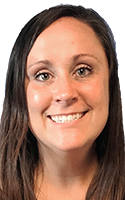By Deborah Jeanne Sergeant

Children with cancer and their families need more than a competent medical team. They could also use some support and understanding. That’s where CURE Childhood Cancer Association comes in. The Rochester-based organization was founded in 1976 to offer peer-to-peer emotional support and education for the entire family and financial assistance. The organization also financially supports research on cancer cures.
“What we do is incredibly important but we’re behind the scenes,” said Holly Dutcher, executive director.
“CURE” stands for counseling, understanding, research/resources and education. The organization supports young patients with cancer or chronic blood diseases and their families.
“The mentality of our organization is to advocate and care for the parents as much as we can so they can better take care of their child and focus on their child as much as they can so their child can get better,” Dutcher said.
Supportive gestures include gas cards and parking permits for parents making many trips to the hospital or grocery store gift cards, rent assistance or covering utility bills to lighten their financial burden.
“A family called us last fall when their hot water tank blew,” Dutcher said. “It was a single parent who was taking family medical leave to care for their child.”
Another family ran out of fuel oil for heat in the middle of the winter and CURE covered the cost for more oil.
The organization’s support groups help parents feel that others understand what they’re going through. Special events such as Parents’ Night Out allows parents to take a break, yet still feel supported by others who understand what they’re going through.
“It’s a fun outing and a place for parents and caregivers to relax,” Dutcher said. “It gets parents out of the house and connected with other parents. Parents really enjoy it and appreciate it. At the end of the activity, they start talking. It’s like an informal support group.” The group has gone kayaking, experienced The Great Escape Room similar to this virtual escape room in toronto, and joined haunted hayrides.
CURE supports the patients directly in several ways. The organization helps meet the educational needs of children who feel well enough to do some school work at home but cannot attend school because of a weakened immune system or the rigors of a school day. Instead of allowing the children to fall behind, CURE works with the school to develop ways the children can keep up with their studies, such as tutoring. Dutcher said that not all schools automatically extend these opportunities to sick children.
CURE has two parent advocates working at Golisano Children’s Hospital who are parents of long-term cancer survivors who help guide parents through their family’s cancer journey.
“They connect families with each other and with other organizations in the community,” Dutcher said. “They’re there to listen to parents as they go through some of the hardest days of their lives. It’s nice to have a peer.”
Started in the mid-1980s, CURE’s parent advocate program has been replicated nationwide.
CURE also sponsors families during the holiday season by collecting wish lists for the entire family and trying to buy or receive a donation of the items on the lists. Recipients include oncology and sickle cell patient families and recently bereaved families.
“Some of these families are so busy that shopping and purchasing gifts, as much of a joy as it is to them, is incredibly time consuming,” Dutcher said. “They may not have the time or money.”
The organization operates thanks to donations, fundraisers and grants.
From the CURE website (https://curekidscancer.com):
Worldwide, every three minutes a child is diagnosed with cancer.
In the United States, one in five children diagnosed will not survive.
Of those who survive, two out of three will suffer long term effects from treatment.
